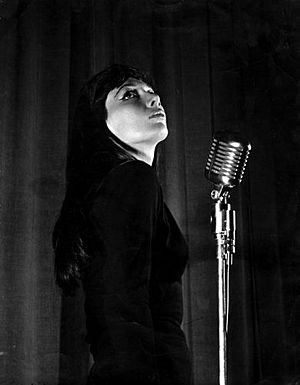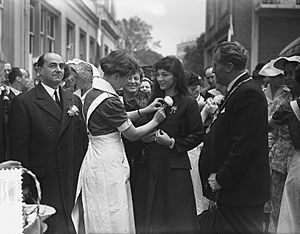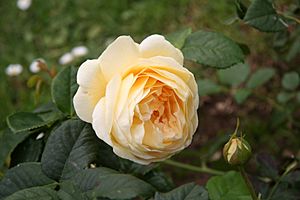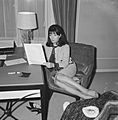Juliette Gréco facts for kids
Quick facts for kids
Juliette Gréco
|
|
|---|---|

Gréco in 1961
|
|
| Background information | |
| Born | 7 February 1927 Montpellier, France |
| Died | 23 September 2020 (aged 93) Ramatuelle, France |
| Genres | |
| Occupation(s) |
|
| Years active | 1946–2016 |
Juliette Gréco (born February 7, 1927 – died September 23, 2020) was a famous French singer and actress. She was known for her unique style and powerful voice. Some of her most famous songs include "Jolie Môme," "Déshabillez-moi," and "La Javanaise." She often sang songs with lyrics written by famous French poets and singers like Jacques Prévert and Serge Gainsbourg. Her amazing career lasted for 60 years, ending in 2015 with her final world tour called "Merci." As an actress, Juliette Gréco appeared in movies by well-known French directors such as Jean Cocteau.
Contents
Early Life and Family
Juliette Gréco was born in Montpellier, France. Her father was from Corsica, and her mother was from Bordeaux. Juliette did not feel loved by her mother when she was a child. She was raised by her grandparents in Bordeaux with her older sister, Charlotte.
After her grandparents passed away, her mother brought them to Paris. In 1938, Juliette started training as a ballerina at the famous Opéra Garnier.
When World War II began, her family moved back to southwest France. Juliette was a student at a school in Montauban. The Gréco family became involved in the French Resistance, a group that fought against the occupation of France. In 1943, her mother was arrested.
Juliette and her sister decided to return to Paris. However, they were captured by the Gestapo (the secret police) in September 1943. Her mother and sister were sent to a prison camp called Ravensbrück. Juliette was only 16, so she stayed in prison for several months before being released. After her release, she walked eight miles back to Paris to get her belongings. Her former teacher, Hélène Duc, took care of her.
In 1945, Juliette's mother and sister returned from the prison camp. This happened after the Red Army freed Ravensbrück. Juliette moved to Saint-Germain-des-Prés in Paris in 1945. Her mother had moved to Indochina, leaving Juliette and her sister behind.
Personal Life and Passing
Juliette Gréco was married three times during her life:
- She married actor Philippe Lemaire (from 1953 to 1956).
- Then she married actor Michel Piccoli (from 1966 to 1977).
- Her last marriage was to pianist Gérard Jouannest (from 1988 until he passed away in 2018).
With Philippe Lemaire, she had a daughter named Laurence-Marie. Laurence-Marie was born in 1954 and sadly passed away from cancer in 2016. She was 62 years old.
Juliette Gréco lived in both Paris and Saint-Tropez.
She passed away on September 23, 2020, at the age of 93.
Her Legacy and Influence
Juliette Gréco's life and style inspired many artists.
- Actress Anna Mouglalis played Juliette Gréco in the 2010 movie Gainsbourg: A Heroic Life.
- The famous writer Jean-Paul Sartre based a singer in his book series The Roads to Freedom on Juliette Gréco.
- English singer Ray Davies mentioned Gréco in his song "Art School Babe."
- The famous song "Michelle" by the Beatles was inspired by Juliette Gréco. It was also inspired by the artistic culture of Paris. Paul McCartney said that he and his bandmates admired Juliette Gréco. He said she was a "real chanteuse," which means a female singer.
- John Lennon wrote that he always dreamed of a woman like Juliette Gréco. He described her as beautiful, intelligent, and free-spirited.
- Singer Marianne Faithfull said that Juliette Gréco was her "absolute idol" when she was young. She called Gréco her "role model for life."
In 1999, a special rose was named after her. It is called the "Juliette Gréco" rose.
Awards and Honors
Juliette Gréco received several important awards from France:
- Commander of the Legion of Honour (2012): She was first a Knight (1984), then an Officer (2002).
- National Order of Merit (2015): She was first an Officer (1999), then a Commander (2006).
- Commander of the Order of Arts and Letters (2016).
Her Books
Juliette Gréco wrote two autobiographies, which are books about her own life:
- 1982: Jujube (published in French)
- 2012: Je suis faite comme ça (meaning "I am made like this")
Notable Songs
- 1950: Si tu t'imagines: written by Raymond Queneau and composed by Joseph Kosma.
- 1950: La Fourmi : written by Robert Desnos and composed by Joseph Kosma.
- 1951: Je suis comme je suis : written by Jacques Prévert and composed by Joseph Kosma.
- 1951: Les Feuilles mortes: from the movie Les Portes de la nuit, written by Jacques Prévert and composed by Joseph Kosma.
- 1951: Sous le ciel de Paris: from the movie Sous le ciel de Paris : written by Jean Dréjac and composed by Hubert Giraud.
- 1951: Je hais les dimanches: written by Charles Aznavour and composed by Florence Véran.
- 1953: La Fiancée du pirate: extract from L'Opéra de quat'sous.
- 1954: Coin de rue: written and composed by Charles Trenet.
- 1955: Chanson pour l'Auvergnat: written and composed by Georges Brassens.
- 1957: Musique Mécanique: written by Boris Vian and composed by André Popp.
- 1957: La Complainte du téléphone: written by François Billetdoux and composed by André Popp.
- 1959: De Pantin à Pékin : written by Pierre Delanoë and composed by André Popp.
- 1959: Il était une oie : written and composed by Serge Gainsbourg.
- 1960: Il n'y a plus d’après : written and composed by Guy Béart.
- 1961: On n'oublie rien : written by Jacques Brel.
- 1961: Jolie Môme: written and composed by Léo Ferré.
- 1961: C'était bien (Le P'tit bal perdu): written by Robert Nyel and composed by Gaby Verlor.
- 1961: Le Temps passé : written and composed by Georges Brassens.
- 1961: Chandernagor : written and composed by Guy Béart.
- 1962: Accordéon : written and composed by Serge Gainsbourg.
- 1962: Paris Canaille : written and composed by Léo Ferré.
- 1963: La Javanaise : written and composed by Serge Gainsbourg.
- 1966: Un petit poisson, un petit oiseau : written by Jean-Max Rivière and composed by Gérard Bourgeois.
- 1967: Déshabillez-moi : written by Robert Nyel and composed by Gaby Verlor.
- 1970: Les Pingouins : written and composed by Frédéric Botton.
- 1971: La Chanson des vieux amants : written by Jacques Brel and composed by Gérard Jouannest.
- 1971: J'arrive : written by Jacques Brel and composed by Gérard Jouannest.
- 1972: Mon fils chante : written by Maurice Fanon and composed by Gérard Jouannest.
- 1977: Non monsieur je n'ai pas vingt ans: written by Henri Gougaud and composed by Gérard Jouannest.
- 1983: Le Temps des cerises : written by Jean Baptiste Clément and composed by Antoine Renard.
- 1988: Ne me quitte pas : written and composed by Jacques Brel.
- 2006: La Chanson de Prévert : written and composed by Serge Gainsbourg.
- 2009: Le Déserteur: written and composed by Boris Vian.
Filmography
- 1947: The Bouquinquant Brothers (by Louis Daquin) – A nun
- 1948: Ulysse ou les mauvaises rencontres (Short, by Alexandre Astruc)
- 1949: Au royaume des cieux (by Julien Duvivier) – Rachel
- 1950: Orphée (by Jean Cocteau) – Aglaonice
- 1951: Sans laisser d'adresse (by Jean-Paul Le Chanois) – The singer
- 1952: The Green Glove (by Rudolph Maté) – Singer
- 1953: When You Read This Letter (by Jean-Pierre Melville) – Thérèse Voise
- 1953: Saluti e baci (by Maurice Labro and Giorgio Simonelli) – Herself
- 1953: Boum sur Paris (by Maurice de Canonge) – Juliette Gréco
- 1956: Elena and Her Men (by Jean Renoir) – Miarka, the gypsy
- 1956: La Châtelaine du Liban (by Richard Pottier) – Maroussia
- 1956: L'Homme et l'Enfant (by Raoul André) – Nicky Nistakos
- 1957: The Sun Also Rises (by Henry King) – Georgette Aubin
- 1957: C'est arrivé à 36 chandelles (by Henri Diamant-Berger) – Herself
- 1957: Œil pour œil (by André Cayatte)
- 1958: The Naked Earth (by Vincent Sherman) – Maria
- 1958: The Roots of Heaven (by John Huston) – Minna
- 1958: Bonjour tristesse (by Otto Preminger) – Herself
- 1959: Whirlpool (by Lewis Allen) – Lora
- 1960: Crack in the Mirror (by Richard Fleischer) – Eponine / Florence
- 1961: The Big Gamble (by Richard Fleischer) – Marie
- 1962: Where the Truth Lies (by Henri Decoin) – Myriam Heller
- 1963: Canzoni nel mondo (by Vittorio Sala) – Herself
- 1964: The Chase (by Michel Boisrond) – A guest at Sylvie Vartan's show
- 1964: Love at Sea (by Guy Gilles) – The film actress
- 1965: Uncle Tom's Cabin (by Géza von Radványi) – Dinah
- 1967: The Night of the Generals (by Anatole Litvak) – Juliette
- 1967: Le Désordre à vingt ans (Documentary, by Jacques Baratier) – Herself
- 1973: Le Far West (by Jacques Brel)
- 1975: Lily aime-moi (by Maurice Dugowson) – Flo
- 1999: Lettre à mon frère Guy Gilles, cinéaste trop tôt disparu (Documentary, by Luc Bernard) – Herself
- 2001: Paris à tout prix (Documentary, by Yves Jeuland) – Herself
- 2001: Belphégor, le fantôme du Louvre (by Jean-Paul Salomé) – Woman in the cemetery
- 2002: Jedermanns Fest (by Fritz Lehner) – Yvonne Becker (final film role)
Images for kids
See also
 In Spanish: Juliette Gréco para niños
In Spanish: Juliette Gréco para niños
 | Sharif Bey |
 | Hale Woodruff |
 | Richmond Barthé |
 | Purvis Young |




